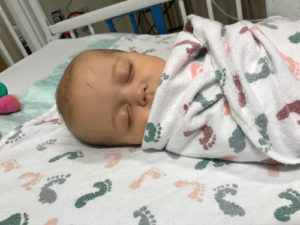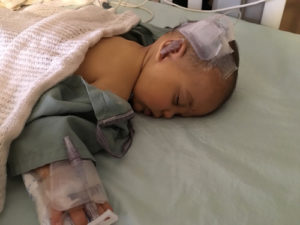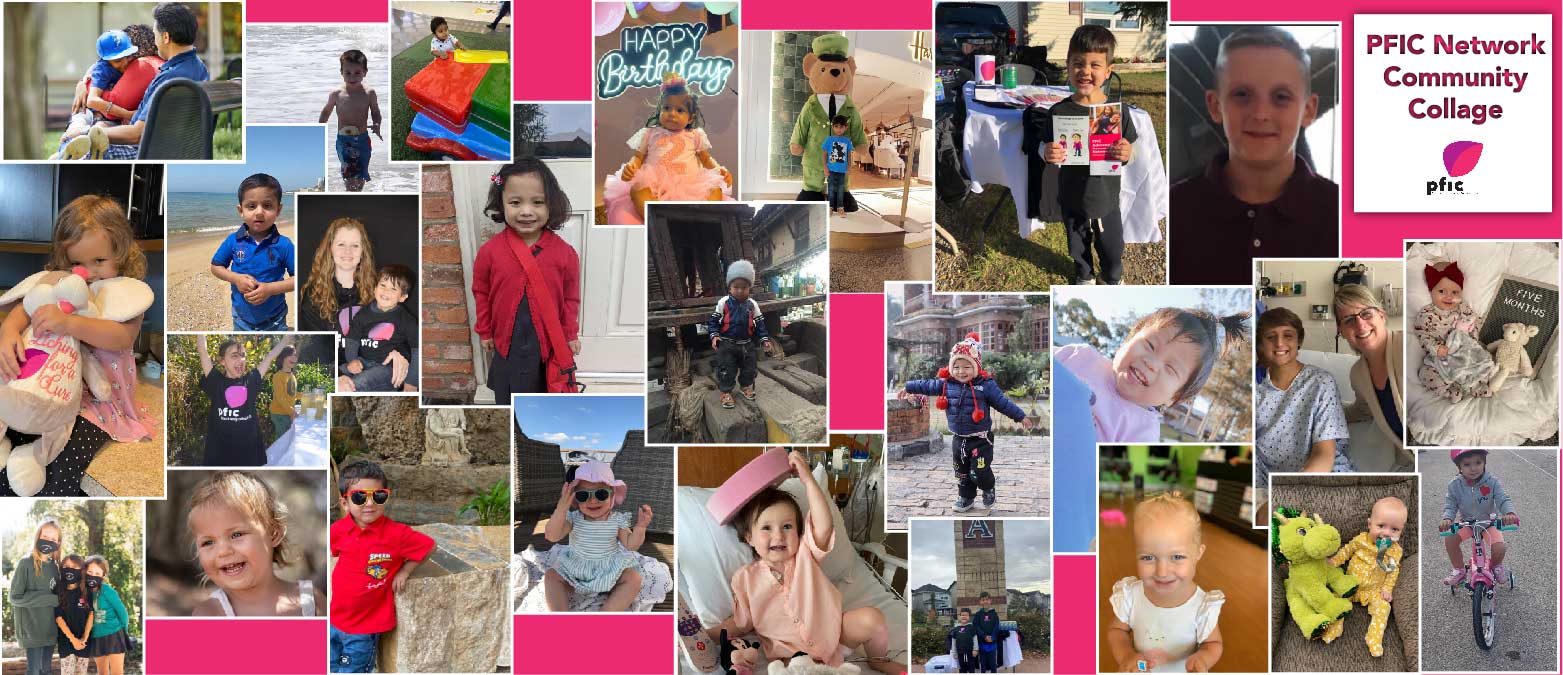Anonymous Parent Story
I was exhausted, exhausted from being exhausted. After the doctors exam I meticulously replaced clothes over a severely calloused, scraped up, scarred, thin body. A baby’s body, that was also exhausted, irritable and I’ll say it, horrendously itchy. A baby that spent countless hours crying and thrashing about trying to soothe the itch as an alternative to anything else, including sleep. That once again I was desperately nursing as there was nothing else to bring comfort or relaxation to her body. Tears were starting to pour down my face because in order to make this early AM appointment, it frankly took my all…I looked up to see the doctor looking at me, directly in the face. The response, “You know it’s not pain right?”
Not pain? NOT PAIN?
Pain yields an inability to focus, inability to achieve daily living activities, inability to play, eat, sleep….right? Okay. Yeah. Physiologically, yes, different. As a 24/7 caretaker, as a mother….it felt pretty hard to distinguish….and I had never felt my situation was so horribly misunderstood.
Hello everyone, allow me to share my journey with PFIC. I am sharing from a caregivers perspective with the hope it conveys some of the challenging aspects that PFIC patients and their families experience.
I am very grateful that my journey started off slightly different from many here in that my daughter’s PFIC diagnosis was swift and caught very early in life. Our pediatrician noticed an ever so slight olive tint to her skin that yielded a conjugated bilirubin check….his words, “don’t worry, it’s probably some lingering breast milk jaundice. Of course there is this other crazy rare genetic stuff that we have to make sure it’s not” . He earned a MVP award in my book that day. Then, my story lines up with many before me, labs, genetics, the game changing news….

Grieving aside (let’s face it, that’s another story parents in my shoes could write small novels on), I was now on the pursuit for information! On my first encounter with a specialist post diagnosis, the challenges to understanding mounted:
I asked, “will my child have to be transplanted? When?”
Answer: “well, yeah, if she needs a transplant, we will do a transplant. We will just wait and see what the next labs show okay”
And at the time it felt like my question was disregarded, perhaps a lack of effort put forth? But now I get it, we just don’t know. The answers aren’t there. The paths are so vastly different for patients…. How frustrating I had to fill in that information for myself. How frustrating it was to leave with no direction and complete confusion at what we were expecting. Enter Google. I found PFIC.org GOLD stars all around to the moms that predate me. It helped and it helps so much to have someone to reach out to. Stories to hear. What a difference it made. These few anecdotal stories were huge, something to cling to, a slight comprehension of what clinical pathways this disease takes. More please.
At the age of 5 mo my baby began to display the tell-tale itching. And I have to say, the word “itching” doesn’t do it justice. Digging, grabbing, gouging, scraping, grating, clawing with all her might….maybe these words as a group come closer to what I witnessed. This “itch” corroded every facet of what I considered “normal life”, controlling every action and thought I had when it was in full swing.
Itching took over daily living: accomplishing diaper changes, bathing, what to wear, how to do literally anything without adding scratches was a constant battle. Tricks and tips on how to avoid and curb the itch became an obsession, yes I have a list. Ways to avoid the itch included: avoid temperatures over 70, avoid crying, avoid stress, no synthetic clothing……perfect, that’s reasonable I’ll just do that.

Itching took over play: distraction was a key tool for coping. Toys worked at times and not at others. There would be short bursts of interest in something before she would be scratching again. I’ll never forget watching her attempt to open her 1st birthday gifts in my dad’s lap, the desire to rip open the paper and find the present inside was there, she tried, but she couldn’t do it, she kept itching her nape instead.
Itching took over eating: the go-to for comfort was milk. Lots of milk. Makes sense. The ability to sit still in a high chair in order to consume food wasn’t there, too itchy. With treats even on the tray the itch would win. Even with help, very little or nothing was eaten. I couldn’t blame her, who wants to eat when you are exhausted and horrendously itchy? I’ll never forget watching her look at a bowl of Cheerios (her favorite) wanting one, but she couldn’t even go to reach for them because she couldn’t stop scratching her own hands to do so.
Itching took over sleep: The lack of and challenges of sleep were so severe for us, I am at a loss on how to describe it. Exhausted doesn’t begin to cover it… 45mins at a time, for months… she fell asleep itching and was rubbing before she even opened her eyes…. Ill never forget how traumatic it was for us, I’ll leave it at that.
Our lives snowballed downhill very quickly, quality of life took a deep dive for our whole family. A baby that couldn’t sleep forced me to leave my full time job, which led to financial strain, which led to us needing to relocate to gain additional help. All of this was a massive burden on our marriage and a huge draw on our support system.
It was like my whole life was on a pause from everything but my daughter and the itch that consumed her.
I wanted to give the emotional trauma of itching it’s own nod. Aside from the physical difficulty it brings, like lack of sleep, the mental insult is brutally harsh. Watching your own child hurt themself whenever they can due to an unstoppable itch is devastating. Repeatedly using all interventions I know to help with little or no progress is defeating. To have people around you observe behavior, during her most distracted window of the day, and then to you give the feedback that she seems under control is defeating (especially when it’s a doctor or nurse). To not have the energy left to explain and educate those around us about the intricacies of the itch (ie no, I cannot put her in that summer dress, she would be scratched raw) is defeating.
We were what I perceive to be incredibly lucky (in the PFIC world). We were able to get access to a new medication at a young age, and even more lucky that it worked for her genetics. Wow. What a 180. Life changer, miracle? Darn close. I feel like because of the medication am even able to write this, it brought us out of the fog we lived in. I feel many days, dare I say it, that I have a normal child, her itch is minimal. Eating, playing, growing, and yes, sleeping. And all from just a medication. My child knows nothing of surgery or hospital stays as of now. It feels surreal at times to watch my child have a bare arm and it simply not be an issue…. And I still cry at the relief of it all.
The medication I speak of is an Ileal Bile Acid Transport Inhibitor (an IBAT inhibitor). This medication is so paramount to our life, I could not imagine the results and path backwards without it. I look to the day that it will be available to all those in the PFIC world: without families having to face costs, trials, or access issues of any sort! And upon diagnosis (age permitting), what a difference it would have brought. I also know it doesn’t work for all and the desperate need for other options is still very much the reality.
Transplant is still our future as far as I’m aware. When? Again, no one knows.
I have been told by multiple health care workers how well their transplanted patients are doing. It brings hope and positivity to a family who may need to face this with their small child. But at the same time, the idea of transplant makes me cringe. It’s downright gut wrenching to have the knowledge that that particular future lies in store for her. I simply don’t want that to be her. I don’t want to navigate those waters financially, emotionally or medically. I want our medication to be the course, and for us to be able to move on with life.
One of the most common questions I am asked by those around us is: why don’t I just get her a transplant? You know, take care of it? It’s the logical thought, I get it, fix the problem. Initially I didn’t have a great answer to this….. now, I immediately drop the “immunocompromised for life” answer and it no longer seems like the fix it did. I also know that for some PFIC patients that’s the tip of the iceberg post transplant. I am hoping we have time before reaching that road, time for her to grow up, time for medicine to improve, and maybe maybe, time enough that a PFIC diagnosis won’t be that a transplant is the inevitable. That’s my dream.
I know, though, being a PFIC mom, I will just have to see what happens.
Thank you all for listening and being here today. Any step towards helping these children is greatly appreciated! Rare but Mighty!
Poem: I wrote this when things were bad.
I can’t wear short sleeves
I can’t be in hot weather
I can’t wear shoes
I can’t take a bath
I can’t focus
I can’t play
I can’t eat
I can’t sleep
I ITCH
